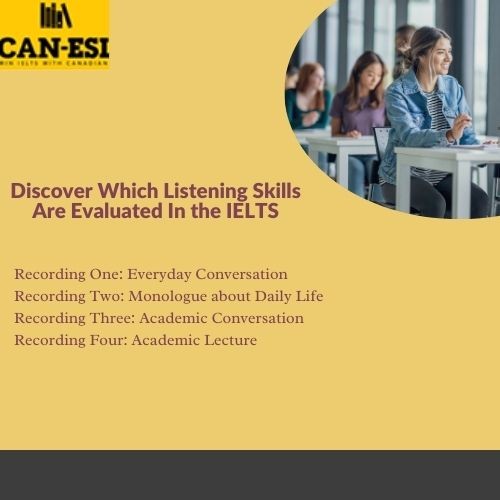

Mastering the IELTS Listening Section: A Guide to Success
Listening is more than just hearing words; it’s about
understanding, interpreting, and engaging with what’s being said. In the IELTS
exam, your listening skills play a pivotal role in showcasing your language
proficiency. Whether you're preparing for the IELTS Academic or General
Training test, the listening section presents an opportunity to demonstrate
your ability to comprehend spoken English in various contexts. In this blog
post, we’ll explore what examiners are looking for and provide some practical examples
to help you achieve a successful score.
Understanding the IELTS Listening Section
The listening section of the IELTS is uniform for both
Academic and General Training versions. It comprises 40 questions to be
answered within 30 minutes. You’ll listen to four different recordings, each
designed to test specific listening skills. Let’s delve into each type of
recording and the skills assessed:
Recording One: Everyday Conversation
Example: You’ll hear a dialogue between two people
discussing plans for an upcoming event.
Speaker 1: "Hey, have you heard about the event next
week?"
Speaker 2: "Yeah, I have. What’s it for?"
Speaker 1: "We’re welcoming our new colleague, Sarah.
It’s a bit of a get-together."
Speaker 2: "Oh, that sounds nice. So, it’s not a
birthday or charity event, right?"
Speaker 1: "No, it’s just a welcome party for
Sarah."
Speaker 2: "Got it. Count me in!"
A) To celebrate a birthday
B) To raise money for a charity
C) To welcome a new colleague
D) To organize a surprise party for a friend
Skills Evaluated:
Recording Two: Daily Life Monologue
Example: You’ll listen to a talk or presentation
about staying healthy during the winter months.
"In today’s talk, I’d like to discuss some essential
tips for staying healthy during the winter months. As we all know, this season
can bring about its own set of health challenges. One important step to
safeguard your health is to consider getting a flu shot. The flu can be
particularly severe during the winter, and vaccination can provide a crucial
layer of protection. While a flu shot is important, there are other strategies
you can adopt as well. Regular outdoor exercise, even in cold weather, can
boost your immune system. Additionally, consider taking vitamin supplements to
ensure you’re getting the necessary nutrients your body needs. Another vital
point to remember is to avoid close contact with individuals who are sick, as
many winter illnesses are contagious. So, remember, while a flu shot is
crucial, a combination of these practices can help you stay healthy throughout
the winter."
A) Exercising outdoors
B) Taking vitamin supplements
C) Avoiding contact with sick people
D) Getting a flu shot
Skills Evaluated:
Recording Three: Academic Conversation
Example: You’ll hear a conversation among individuals
discussing scheduling conflicts in an academic setting.
Speaker A: "I’m worried about the event next week. It
seems like there’s a conflict with our schedules."
Speaker B: "Yes, you’re right. The conference is on the
same day as our workshop. We can’t be in two places at once."
Speaker A: "I know, and both are crucial. We need to
find a solution to this problem."
Speaker B: "I agree. We could potentially reschedule
the workshop or find a different time for the conference."
Speaker A: "That might work, but we should also
consider the participants’ availability. Let’s not forget to check with
them."
A) Technical difficulties with a computer
B) Scheduling conflicts for an event
C) A lack of interest in the topic
D) An issue with finding a venue
Skills Evaluated:
Recording Four: Academic Monologue
Example: You’ll listen to a university lecture on
climate change.
"Good afternoon, everyone. Today, we’re going to delve
into a critical issue that affects us all—climate change and its profound
impact on modern society. As we know, the world is experiencing a range of
environmental challenges, from rising global temperatures to extreme weather
events. In this lecture, we will explore how these changes are altering the way
we live, affecting everything from agriculture to energy sources and urban
planning. We’ll also discuss the importance of adapting to these shifts and the
role individuals, communities, and governments play in mitigating climate
change’s far-reaching consequences."
A) The history of ancient civilizations
B) The impact of climate change on modern society
C) The role of technology in contemporary education
D) The study of cognitive development in children
Skills Evaluated:
Tips for Improving Your Listening Skills
Improving your listening skills takes practice and
dedication, but by understanding the types of recordings you’ll encounter and
honing your ability to respond accurately, you can increase your chances of
achieving a top score on the IELTS listening section.
Ready to put your skills to the test? Book your IELTS
exam now and take the next step towards your academic and professional goals!
For more tips and guidance on preparing for the IELTS, visit
canesl.ca.